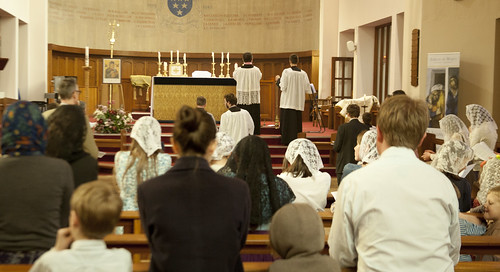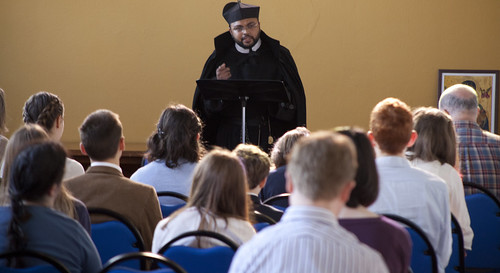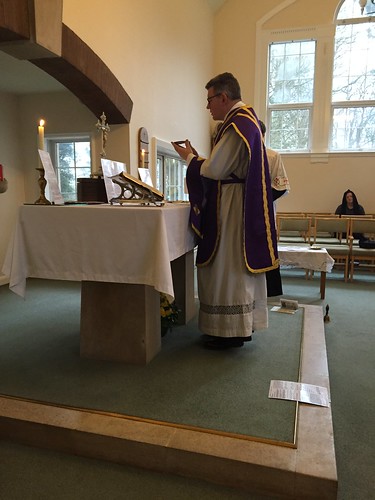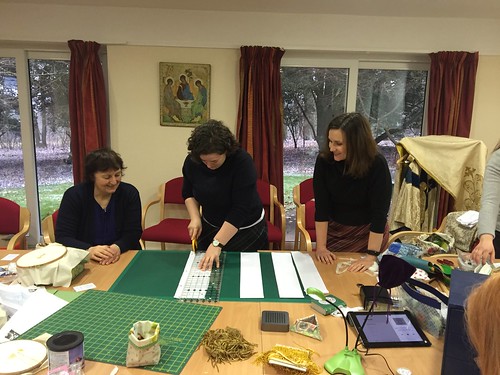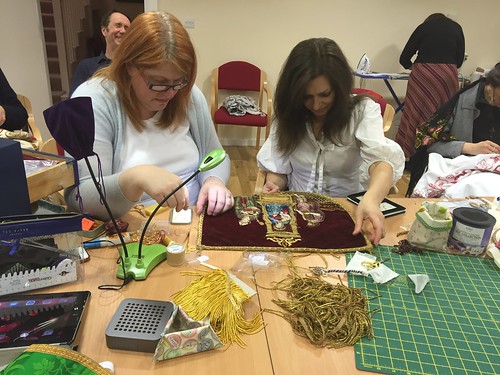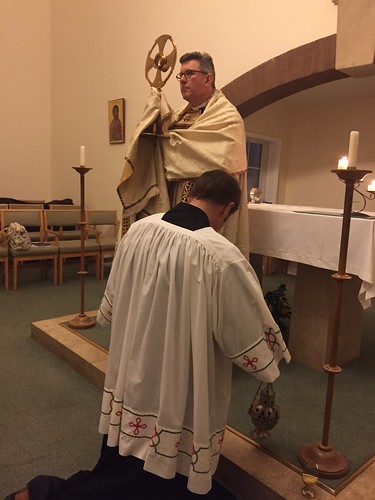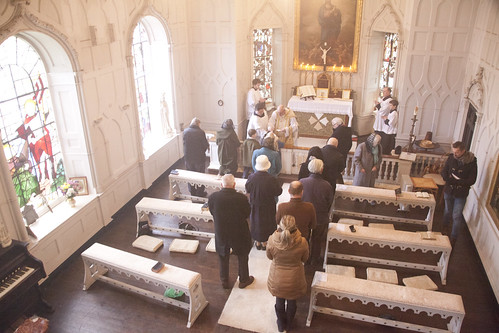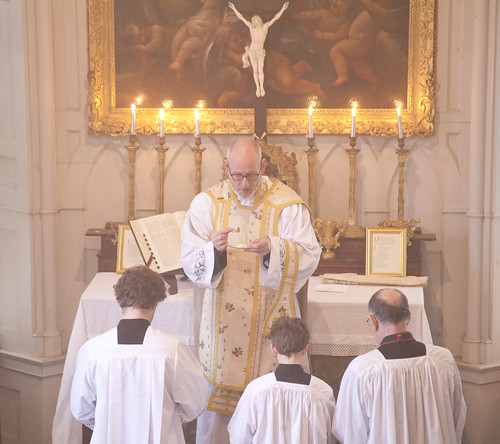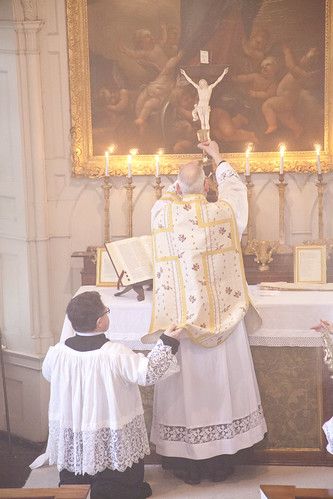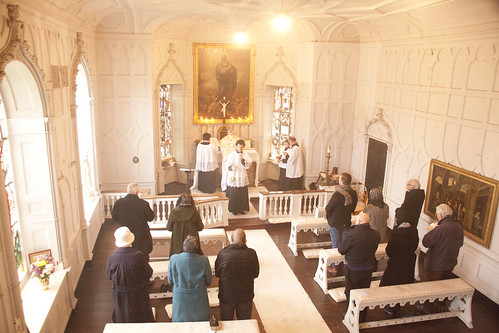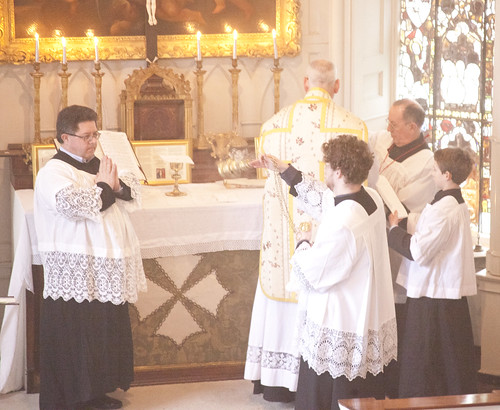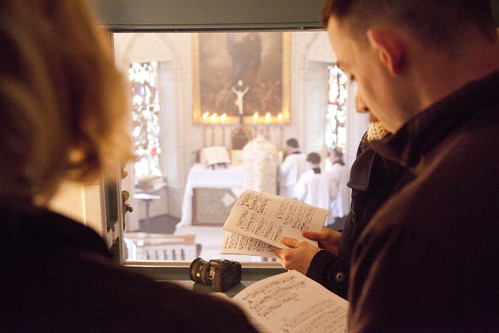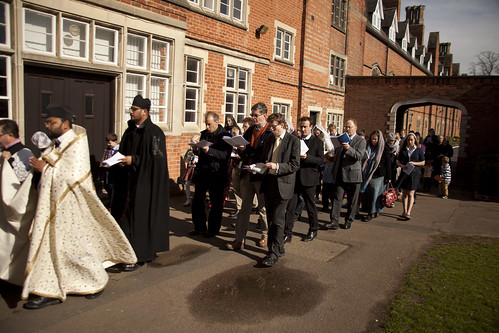Chairman's Blog
Juventutem Mass in London 24th Feb
7:30pm Friday 24 Feb: Mass will be celebrated by Fr Armand de Malleray FSSP.
Music by Cantus Magnus directed by Matthew Schellhorn:
Messa da Capella a quattro voci Monteverdi
Sicut cervus Palestrina
Sitivit anima mea Palestrina
Support the work of the LMS by becoming an 'Anniversary Supporter'.
A pre-history of the Guild of St Clare

It seems the Guild of St Clare has a pre-history: there existed, up to about the time of Vatican II, a 'St Clare's Guild' for sewing in Catholic parishes in the United States. I'd be interested to hear more about this Guild from those who have any information.
On a regular basis, the Guild would meet to sew what I recall were "pads for cancer patients". There may have been other projects that they worked on, but I recall that one. As to the spirituality of the group, I have no clue, nor whether it was promoted by my parish (Nativity of Our Lord) or the Archdiocese of St Paul Minnesota.
What I recall was a large number of women gathering at the house on an occasional basis and hand sewing. My Mother would refer to it as the St. Clare Guild, and she participated in it probably until 1960 or so. That was a time, of course, when many women did not work outside the house but would involve themselves in charitable work.
There was quite a bit of adult catechesis at the time as well. My Mother also belonged to a parish sponsored "women's discussion club". There were many such discussion clubs set up by my parish on a neighborhood basis. Members were asked to read chapters of books written by Catholic authors (it was the time of Venerable Bishop Fulton Sheen) and gather to discuss what they had read.
In addition to the women's discussion club, there were discussion clubs for couples and both of my parents participated in the one for our neighborhood.
Comment: Any group of skilled ladies doing vestment repairs would have suffered the same fate as groups of skilled singers: under the new dispensation they were no longer needed, or only for things which would not have motivated them to hang around. The new spirituality did for any groups based on spiritual matters.
St Catherine's Trust Family Retreat: 31st March to 2nd April
The Family Retreat is back in the Oratory School near Reading this year, for Passion Sunday weenkend (the weekend before Palm Sunday), led by Fr Serafino Lanzetta of the Gosport friars. Details and booking here.
The Family Retreat, run by the St Catherine's Trust, is designed to make it possible for the parents of small children to attend a retreat without leaving their children behind. We arrange activities for the children during the spiritual conferences. Everyone is welcome, however: you don't have to bring children with you!
The Oratory School is a lovely setting for the Retreat, with two chapels and extensive and beautiful grounds. Last year we used Ratcliffe College near Leicester, as the Oratory School wasn't available.
The Retreat runs alongside the GCN Chant Training Weekend so the chant singers accompany our liturgies: Mass, Benediction, Vespers, and so on.
For some years now we have been using different Retreat givers each year; last year we had two priests of the Sons of the Most Holy Redeemer, from Papa Stronsay.
The Latin Mass Society provides bursaries which HALVE the cost to families who would not otherwise be able to come.
It is a great event, do join us!
Support the work of the LMS by becoming an 'Anniversary Supporter'.
Guild of St Clare Sewing Retreat: report
I've pinched some of the photos; the Guild has a short report on their blog.
"Our first ever sewing retreat finished yesterday, and I for one enjoyed myself enormously. With snow falling outside over the panoramic views of Oxfordshire countryside, an infinite supply of tea and biscuits and good company, what could be more agreeable than a weekend of sewing punctuated by traditional liturgy?"
Support the work of the LMS by becoming an 'Anniversary Supporter'.
Mass in Milton Manor: photos
Fr Philip Harris celebrated a Missa Cantata in the lovely private chapel at Milton Manor House for the Latin Mass Society yesterday. The Schola Abelis accompanied Mass for the Apparition of the Immaculate Conception with chant.
Support the work of the LMS by becoming an 'Anniversary Supporter'.
The Church's calendar and popular culture
Reposted from 2014.
--------------------------------------
Yesterday was St Valentine's Day. That is what a thousand shop windows, restaurant menus, and service station card racks proclaimed. St Valentine was a martyr of the 3rd Century, over whose tomb a basilica was built when he Church's time of persecution was over. I attended Mass in his honour, and in the name of the Church the celebrant implored God's mercy in light of St Valentine's merits.
Collect:
Grant, we beseech Thee, O almighty God, that we, who celebrate the heavenly birthday [ie, death] of blessed Valentine, Thy Martyr, may by intercession be delivered from all the evils that threaten us. Through our Lord...
Secret:
We beseech Thee, O Lord, graciously receive the gifts we offer Thee: and may they, in view of the merits of Thy blessed Martyr Valentine, be of help to us towards our salvation. Through our Lord...
Postcommunion:
O Lord, may this heavenly Mystery be to us the renewal of of soul and body, that by the intercession of the blessed Valentine, Thy Martyr, we may feel the influence of this Sacrifice. Through our Lord...
This, of course, was Mass in the Extraordinary Form. In the Ordinary Form we don't find mentions of Sacrifice scattered through the proper prayers. Or the merits of the saints. Or their intercession. Nor is it made as clear as this that the gifts we offer God in Mass are not the unconsecrated bread and wine, but the Body and Blood of Christ by which are saved. And then again, in the Ordinary Form St Valentine is not celebrated on his historic feast day, the day of his death all those centuries ago.
It is hard to find anyone (at least, on Twitter) willing to defend the decision to take away the liturgical celebration of the saint who has, however unwillingly, given his name to the secular phenomenon of Valentine's Day. But by chance I read something which suggests that it may not be just a coincidence, that in their clear-out of the saints of ancient Rome from the calendar (where they used to be heavily represented: this is, after all, the Roman Rite we are talking about), the reformers turfed out someone with the cultural significance of St Valentine.
It was Bugnini, talking about Ash Wednesday. It is inconvenient to have it on a Wednesday, he thought; much better on a Sunday. This is impossible, however: you can't have a penitential liturgy on a Sunday. So he had to leave it on Wednesday after all. (A close shave for another ancient tradition!) But he wanted to allow the imposition of Ashes to take place any day between Ash Wednesday and the following Monday. Having it on the Wednesday, you see (The Reform of the Liturgy, p307, n7)
 |
| In England, admittedly, the celebration of the day before Ash Wednesday is a little more restrained. |
'had the drawback of keeping the association with Mardi Gras.'
Come again? The association with Mardi Gras is a drawback? The fact that calendar and the practice of penance has become so deeply embedded in popular culture that it is impossible to avoid it, in many cultures: this is a bad thing?
A third example occurs to me: Halloween, the Eve of All Hallows (All Saints). When All Saints falls on a Saturday or a Monday, the bishops of England and Wales, in their wisdom, move it to Sunday. This means that, except in the Extraordinary Form, Halloween is not followed by All Saints. Either it is separated from it by a day, or it falls on the same day. This horrible clash happened in 2010. But perhaps the bishops, when this decision was made (many years ago), didn't actually want to make the connection with Halloween.
What is going on here? It is true that in each case, the secular celebrations have taken a problematic turn. In the case of Mari Gras, this has been the case for many centuries. They have become unCatholic, to say the least. The response of Bugnini and those who think like him seems to be that we should retreat into a bunker, at this point, stick our fingers in our ears and pretend that they are not happening, or at least have nothing to do with us. The Church, they seem to think, should disown them. This kind of response is regularly made by puritanical types in relation to the secular celebration of Christmas: we should eschew Christmas trees and Father Christmas and presents and having fun, and pretend this has nothing to do with the Birth of the Saviour.
The spirit of the New Evangelisation, however, takes the opposite view. These are opportunities to evangelise. We Catholic invented all these things, or (in the case of the Christmas tree and Father Christmas), have long made them our own. Even the worst aspects, the occult references in some places in Halloween, for example, are a sort of shadow of the Catholic teaching, and can give us the opportunity to talk about it. We don't need to approve of fornication on St Valentine's Day, or getting drunk on Mardi Gras, but rather than ignoring these things, we should engage with them. That is what Pope Francis was doing by giving special blessings to engaged couples on the ... feast of SS Cyril and Methodius, yesterday. (Funnily enough, the Vatican News Service called it the Feast of St Valentine. Those trads must be infiltrating...)
The liturgical reform is usually characterised as optimistic, open to 'secular values', and in some ways it is. I think, however, that deep down there was a lot of timidity, of fear, a feeling that the Church has lost control of popular culture and needs to return to the catacombs, where the chosen few can 'participate', and outsiders can be made to feel as though they have stumbled into an intimate gathering of chums. This attitude doesn't get us anywhere. We have to go out there and make use of whatever vestiges of Christianity we can find. Even those embedded in cultural artefacts with origins in anti-Catholic polemic can be useful, like cult of the anti-hero Guy Fawkes.
Soon, after all, there will be precious little in the way of Catholic institutions to shelter us.
Spring 2017 Mass of Ages now on sale
 Leading articles feature Buckfast Abbey, The Old Mass and Children, a round-up of an extraordinary Christmas for the Traditional Mass and Gregory Hogan reports on plans to open a new Catholic academy in the Diocese of Portsmouth. These, together with the usual features, a wealth of news, reviews and reports all show how love of the Traditional Mass is growing around the country.
Leading articles feature Buckfast Abbey, The Old Mass and Children, a round-up of an extraordinary Christmas for the Traditional Mass and Gregory Hogan reports on plans to open a new Catholic academy in the Diocese of Portsmouth. These, together with the usual features, a wealth of news, reviews and reports all show how love of the Traditional Mass is growing around the country.
If you're not a member, and may not see one in a local church this weekend, you can get one sent to you for just the postage from the LMS shop.
Support the work of the LMS by becoming an 'Anniversary Supporter'.
Christmas Card competition
| Best religious image: well done, ACN |
I will ill on the feast of Candlemas, and I am only just now taking down our Christmas cards, which we have enjoyed over the long Christmas season. The cost of postage seems to be gradually driving them out of fashion, but I think it is a good custom and I would be sad not to receive any.
In a post-Christmas spirit, I thought I'd post up the results of a little informal competition among the cards we received this year, which were as always an interesting selection, and included for the first time cards sold in aid of the Latin Mass Society.
The card above, was in my view the best traditional Christmas image. The prize goes to Aid to the Church in Need, which has long had an excellent selection. Their nearest rival among the cards we've been receiving over the years - at least, till the Latin Mass Society got in on the act - is SPUC, which didn't have such a good year I thought.
This below is what I thought was the least unacceptable secular image. Most secular cards go straight into the bin in my house, to keep the ugly religious ones company. (Zero tolerance for mawkish and otherwise bad art!) The boys are not University students, incidentally, but the pupils of William Shakespear's grammar school in Stratford, and the card seems to have been sold in this institution's support.
| Least unacceptable non-religious image: King Edward's School, Stratford upon Avon. |
Below is the most reiterated theme (excluding the Nativity itself of course). We received no fewer than four different cards showing a partridge in a pear tree. I think this one is charming.
| One of four different Partridge in a Peartree cards we received. |
The prize for the most obscure religious subject goes to Madeleine Beard, who like many artists uses her own very distinctive art for her cards. This rather fun image is of Our Lady of Pontmain. Let us hope Our Lady will have similar pity on the Church today that she had on France in January 1871.
The next one, by contrast, gets the wooden spoon for most badly-printed commercial card. The colours are garish and the images pixillated, and it comes from the Museum Selection, which seems to have gone downhill.
| Most badly printed commercial card: sorry, Museum Selection. |
This is the most outrageously religious card from a totally non-religious institution: in this case, a financial institution in the City of London. Cards to customers of commercial enterprises can be perfuctory, but in this case I shall be happy to continue to patronise them in 2017.
| Some hard-nosed City money-men catch a glimpse of the Light of the World. |
Finally, I thought this was the best card from a religious Institute. I received lovely cards from the Institute of Christ the King, the Fraternity of St Peter, and the Sons of the Most Holy Redeemer, but I liked best of all this year this large and handsome image of St Norbert receiving the Habit from Our Lady, and the Rule from St Augustine: from the Norbertines of Chelmsford.
May all our friends flourish this year!
And for those who still haven't taken down their decorations, take comfort from this. I read in an old book about decorating churches, that in the records of one Medieval English church the custom was to take the Christmas greenery down... on the First Sunday of Lent.
So you have a little time.
Support the work of the LMS by becoming an 'Anniversary Supporter'.
The Ancient Lectionary
Reposted from May 2013, in response to the strange blog post arguing for various improvements to the Extraordinary Form, one of which is that it adopt the OF Liturgical Calendar. (There's another response here, from the excellent Fr Albert Marcello.)
The lectionary seems to many to be an obvious example of something the OF does better than the EF, but it doesn't take long to see why things aren't so simple. The brevity, and the basis of the selection, of the traditional lectionary have their own advantages. As for swapping one lectionary for another, this would produce an incoherent muddle.
--------------------------------------------------
Today I'm publishing a Position Paper for the Una Voce Federation on the Lectionary. Go over to Rorate Caeli to read it.
As I remark there, the claim is often made that the lectionary of the 1970 Missal is an obvious improvement on the old one, on the simple basis that more is better, and the 1970 Missal has more scripture in it. Clearly, however, there are other considerations. First and foremost, the lectionary must make sense liturgically: if we understand that, we will understand the value of the old lectionary, in the context of the old Mass, and why it should be preserved. To replace it with the new lectionary, as if the lectionaries can just be swapped in and out of rites, would be a disaster for the Traditional Mass.
 |
| One of the five extra readings on an Ember Saturday, celebrated in Caversham |
In the Traditional Mass, the readings of each Mass are connected with the other proper prayers and chants of that Mass. There is a series of Sundays (some of the ones After Pentecost) in which, for historical reasons, the gospels have got out of sync with the other propers by one week; because of the nature of the progression of texts this doesn't matter very much. What we never have, however, in the Traditional Mass is a set of readings with absolutely no connection with the chants or prayers, and that is something which is inevitable with a multi-year cycle of readings, unless it were accompanied by the multi-year cycle of prayers and chants. But, obviously, there aren't enough appropriate ancient prayers and chants to go round. (This, of course, is part of the story of why, in the Ordinary Form, the chants are a sort of optional extra, which don't seem very closely connected with the other liturgical texts.) Imposing a multi-year cycle of Sunday readings on the EF would destroy the coherence of its propers.
Another suggestion often made is that we should have a cycle of readings for the ferias outside Lent. There were, once, such cycles (though only for three days each week), so it might even seem a 'traditional' thing to do. Before trying to restore things from the distant past (in the Roman Rite, this cycle disappeared in about 13th Century), we should ask why things developed as they did. The answer is, probably (there is no record of a debate, this is one of those things which just happened), that with the rich sanctoral cycle, and the increasing use of Votive Masses, the ferial cycle didn't get much use outside Lent, so it was pretty pointless. If we want to reverse this development, we have to reverse the whole of it: we have to impoverish the sanctoral cycle, and get rid of Votive Masses. Or else render them liturgically incoherent by insisting on readings with no connection with the theme of those Masses. Is that something we really want to do?
Why not say, with Pope Pius XII, that what happened was an organic development which made the liturgy answer the developing needs of the Faithful? And that our needs are pretty well the same: we need the sactoral cycle, because we have lots of saints to celebrate, and we need Votive Masses, because we have lots of devotions to maintain. These two things, the saints and devotions, are major parts of Catholic life and spirituality, and have been since roughly the period in which the ferial cycle dropped out of use. It's not a coincidence.
Here's Pius XII, again:
Just as obviously unwise and mistaken is the zeal of one who in matters liturgical would go back to the rites and usage of antiquity, discarding the new patterns introduced by disposition of divine Providence to meet the changes of circumstances and situation.
This is all not to say that we can't increase our liturgical exposure to the scriptures. There are a couple of suggestions in the paper which deal with this, notably that, in line with the Second Vatican Council, the recitation of the Divine Office be encouraged. The readings of Sunday Matins are, in fact, closely connected with the readings of the Sunday, and serve as a liturgically coherent expansion and commentary on them. This would be a better outlet for our liturgical zeal than reducing the ancient liturgy to a shambles in the attempt to shoehorn more Gospel passages into it.
Chant Training Weekend: 31st Mar to 2nd Apr, Oratory School
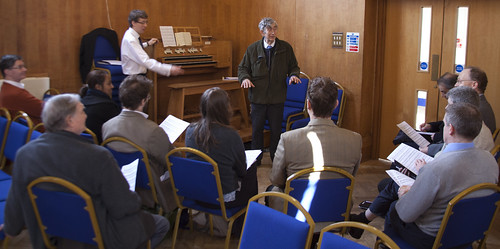 |
| At last's year's course, Colin Mawby discussing organ accompanyment. |
Gregorian Chant Network Chant Training Weekend:
An intensive chant course running alongside the Catherine's Trust Family Retreat (led this year by Fr Serafino Lanzetta). Singers will be prepared to participate in the liturgies of the Retreat, including Mass Ordinaries and Propers, Chants for Benediction and the Office, as well as discussing chant interpretation and history. All liturgies are according to the usus antiquior (the Traditional Mass). With two chant tutors, the group can be split for some purposes into more and less experienced, so everyone can get the most out of it.
Large discounts available for groups coming from choirs and scholas affiliated to the Gregorian Chant Network.
Support the work of the LMS by becoming an 'Anniversary Supporter'.


